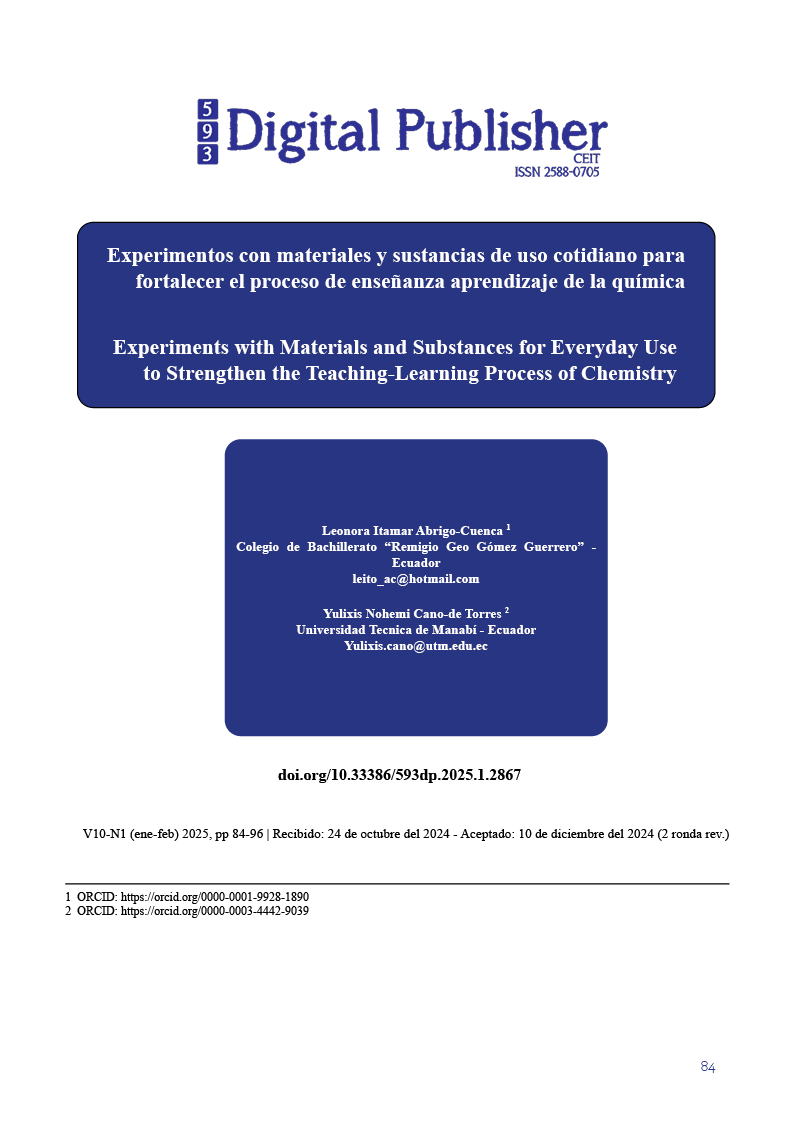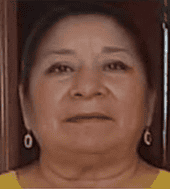Experiments with Materials and Substances for Everyday Use to Strengthen the Teaching-Learning Process of Chemistry
Main Article Content
Abstract
This research was developed to strengthen the teaching-learning process of chemistry in first-year high school students at the Remigio Geo Gómez Guerrero School. Therefore, a study was framed in a quantitative approach methodology, with a positivist paradigm, applying the type of quasi-experimental research and the analytical method. The study population was divided into two groups, a control group and an experimental group, to whom the data collection techniques and instruments were applied, which allows us to highlight among the most important findings the use of an innovative tool within the classroom. of classes such as the application of experiments based on the use of substances and materials from everyday life, and how it can favorably influence the teaching processes applied by teachers for the development of student learning on the topics and contents provided in the chemistry subject for first-year high school students. On the other hand, experiments based on the use of substances and materials from everyday life were designed and applied, the final evaluation of which determined an increase in understanding in the chemistry students of the first year of high school of 70.50% on the contents. presented by the teachers in the subject of chemistry, highlighting the efficiency of the teaching strategy designed, to strengthen the learning of the students of the first year of high school at the Remigio Geo Gómez Guerrero School, which contributed favorably to the successful development of teaching processes within the classroom.
Downloads
Article Details

This work is licensed under a Creative Commons Attribution-NonCommercial-ShareAlike 4.0 International License.
1. Derechos de autor
Las obras que se publican en 593 Digital Publisher CEIT están sujetas a los siguientes términos:
1.1. 593 Digital Publisher CEIT, conserva los derechos patrimoniales (copyright) de las obras publicadas, favorece y permite la reutilización de las mismas bajo la licencia Licencia Creative Commons 4.0 de Reconocimiento-NoComercial-CompartirIgual 4.0, por lo cual se pueden copiar, usar, difundir, transmitir y exponer públicamente, siempre que:
1.1.a. Se cite la autoría y fuente original de su publicación (revista, editorial, URL).
1.1.b. No se usen para fines comerciales u onerosos.
1.1.c. Se mencione la existencia y especificaciones de esta licencia de uso.
References
Armijos, C. (2020). Experimentos con material casero para fortalecer la enseñanza aprendizaje de química en segundo año de bachillerato de la unidad educativa “Manuel Ignacio Monteros Valdivieso” De La Ciudad De Loja, periodo 2018-2019. Loja Ecuador. file:///C:/Users/Admin/Downloads/6514-Texto%20del%20art%C3%ADculo-27541-1-10-20230624.pdf
Castillo, A., Ramírez, M., González, M. (2013). El aprendizaje significativo de la química: condiciones para lograrlo. 2, 11–24.
Duque, C. (2017). La enseñanza de la química desde lo cotidiano a partir de los estándares en los ciclos de básica primaria “guía de experimentos cotidianos”. Universidad Distrital Francisco José de Caldas. Bogotá, Colombia. https://repository.udistrital.edu.co/bitstream/handle/11349/12981/LA%20ENSE%D1ANZA%20DE%20LA%20QUIMICA%20DESDE%20LO%20COTIDIANO%20APARTIR%20DE%20LOS%20ESTANDARES%20EN%20LOS%20CICLOS%20DE%20BASICA%20PRIMARIA.pdf;jsessionid=4E4207620963C55AD818D8520D55722C?sequence=1
Estrada, P. Aléan, A. López,D. (2023). Fortalecimiento de la Competencia Explicación de Fenómenos del Componente Químico, a Través de una Secuencia Didáctica con el Uso del Simulador PhET, en la Institución Educativa Rural Buchadó Medio Sede Alto Rosario. Alto de Rosario, San Pedro de Urabá, Antioquia, Colombia. file:///C:/Users/Admin/Downloads/TGF_Paula%20Estrada_Alvaro%20Alean_Daniela%20Lopez.pdf
Feria, H. Matilla, M. Mantecón, S. (2020). La entrevista y la encuesta: ¿métodos o técnicas de indagación empírica? Revista Didasc@lia: D&E. Publicación del CEPUT- Las Tunas, Cuba. file:///C:/Users/Admin/Downloads/Dialnet-LaEntrevistaYLaEncuesta-7692391.pdf
Fernández, P. Vallejo, G. Livacic, P. Tuero, E. Validez (2014). Estructurada para una investigación cuasi-experimental de calidad. Se cumplen 50 años de la presentación en sociedad de los diseños cuasi-experimentales. Revista Scielo, Anal. Psicol. vol.30 no.2 Murcia may. 2014. https://scielo.isciii.es/scielo.php?script=sci_arttext&pid=S0212-97282014000200039#:~:text=Investigaci%C3%B3n%20cuasi%2Dexperimental%20es%20aquella,investigaci%C3%B3n%20aleatoriamente%20a%20los%20grupos.
González, A., Urzúa, C.(2012).Experimentos químicos de bajo costo: un aporte desde la microescala. Revista Eureka Sobre Enseñanza y Divulgación de Las Ciencias., 9(3), 401–409. https://doi.org/10.25267/rev_eureka_ensen_divulg_cien c.2012.v9.i3.08
Herrera, J. (2018). Las prácticas investigativas contemporáneas. Los retos de sus nuevos plan-teamientos epistemológicos. Revista Scientific, e-ISSN2542-2987. https://www.indteca.com/ojs/index.php/Revista_Scientific/article/view/173/170
Mejías, M. (2014). Implementación de actividades experimentales usando materiales de fácil obtención como estrategia didáctica en la enseñanza aprendizaje de la química en la básica secundaria. Universidad Nacional de Colombia. https://repositorio.unal.edu.co/bitstream/handle/unal/52690/31923131-MariaF.pdf?sequence=1&isAllowed=y
Parga, D. Piñeros, G. (2018). Enseñanza de la química desde contenidos contextualizados. Educ. Quím vol.29 no.1 Ciudad de México ene. 2018. https://www.scielo.org.mx/scielo.php?script=sci_arttext&pid=S0187-893X2018000100004
Sánchez Molina, A. A., & Murillo Garza, A. (2021). Enfoques metodológicos en la investigación histórica: cuantitativa, cualitativa y comparativa. In Debates por la Historia (Vol. 9, Issue 2).
Silva, J. Coello, J. Loja, C. Serrano, G. Castillo, B. (2023). Importancia de la experimentación en el proceso de enseñanza aprendizaje en los niveles de educación básica y bachillerato para potenciar el pensamiento crítico. Ciencia Latina Revista Científica Multidisciplinar Mayo-Junio, 2023, Volumen 7, Número 3. file:///C:/Users/Admin/Downloads/6514-Texto%20del%20art%C3%ADculo-27541-1-10-20230624.pdf
Valenciano, G. (2022). Alcances del constructivismo como paradigma en la investigación Scope of constructivism asa paradigm in research Introducción.Wimblu,17(2), 151–168. https://revistas.ucr.ac.cr/index.php/wimblu/article/view/ 53581/54148



